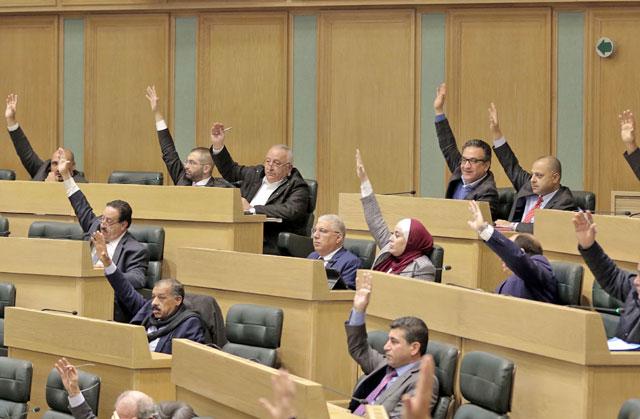You are here
MPs reject new amendments to Cybercrime Law
By JT - Feb 19,2019 - Last updated at Feb 19,2019

The Lower House on Tuesday rejects the amendments to the Cybercrime Law, which were redrafted by the government in December 2018 (Petra photo)
AMMAN — The Lower House on Tuesday rejected the cybercrime law which was redrafted by the government in December last year in a bid to contain rising criticism of the controversial bill by activists, political parties, NGOs and MPs.
In December last year, the government withdrew the cybercrime draft law from Parliament and sent an amended version with a new definition of “hate speech”.
Under the new amendments, the definition of hate speech was revisited to include “every writing and every speech or action intended to provoke sectarian or racial sedition, advocate violence or foster conflict between followers of different religions and various components of the nation”.
The previous definition of the crime, which was criticised for being “loose”, defined hate speech as “each statement or act that is prone to fuel religious, sectarian, ethnic or regional sedition; call for violence or justify it; or spread rumours against people with the aim of causing them, as a result, physical harm or damage to their assets or reputation”.
The new amendments also included a penalty not exceeding two years imprisonment for crimes listed in Article 11 of the original law, which currently imposes a minimum sentence of three months and does not stipulate a maximum punishment.
Another amendment was made, allowing people to criticise officials in relation to job duties, in accordance with the provisions of Article (2/192) of the Penal Code, which states that if the slander is only related to the job duties, and is proved to be so, then the slanderer shall be exonerated, otherwise he/she shall be condemned to the penalty prescribed for slander.
As for comments on social media platforms, including comments on news websites’ pages, the draft law states that only the person who makes the comment is accountable.
Experts and activists criticised the amendments of the withdrawn bill in previous remarks to The Jordan Times, citing a “loose” definition to hate speech, privacy concerns and conflict with other laws that already stipulate penalties for crimes listed in the bill.
The UN’s Human Rights Council also voiced its unease regarding some articles in the previous bill at Jordan’s Universal Periodic Review, in which freedom of expression and the Cybercrime Law were listed as a major issue of concern.
Protesters who rallied near the Fourth Circle called for the withdrawal of the bill, claiming it aims at “suppressing opinions”. A social media campaign was also launched in November last year under the banner “#withdraw_cybercrime_law”, describing it as “a crackdown on freedom of expression”.
Related Articles
AMMAN — The Cabinet on Monday approved a new draft amending the cybercrime law ahead of sending it to the Lower House, after having withdraw
AMMAN — The government on Sunday said it will withdraw the cybercrime draft law, which was referred to the Lower House by the previous gover
AMMAN — While a general consensus has been reached on the need to combat hate speech, concerns have been raised over what one might end up i
















